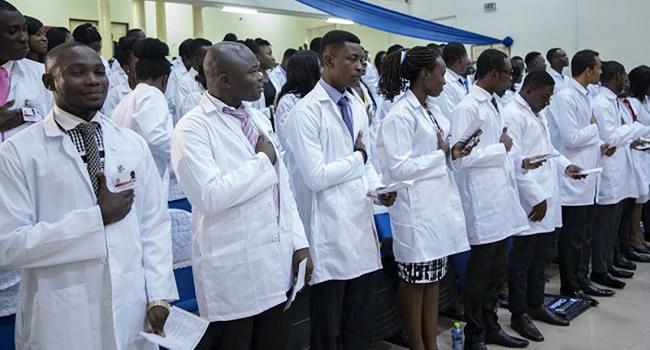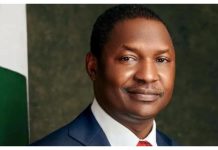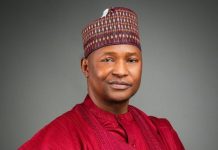Abba Hamisu Sani
Africa-Press – Nigeria. Brain drain is one of the major phenomena that affect Nigeria’s development in many aspects. particularly the health sector which is critical to every nation.
It is no longer a story that Nigerian Health workers are leaving the country to various parts of the world at every opportunity in search of greener pastures.
The United Kingdom, America and Middle eastern countries are the attraction centers for Nigerian Medical Doctors and other health personnel.
Available data indicates that 11,055 Nigerian trained Doctors are practicing in various parts of the United Kingdom which make it the third country with high number of Doctors in the UK after India and Pakistan.
It also shows that no fewer than 5,722 Nigerian doctors who are specialists are practicing in the United Kingdom. 1,540 general practitioners made the list of Nigerian doctors in the UK.
According to the data, 1,228 of the specialists are senior specialists while 4,494 are associate specialists.
These were disclosed through an analysis of the data obtained from the website of the British General Medical Council.
The United Kingdom restricts the recruitment of health workers from Nigeria
The decision of the UK to stop employing Nigerian Doctors is not unconnected with the World health Organization effort to achieve Universal Health Coverage by the year 2030.
The development is contained in the UK’s revised code of practice for recruiting internationally for health and social care organizations.
The revised code, which was updated on 23 March, has its foreword written by the Minister of State for Health, Department of Health and Social Care, Maria Caulfield, and her counterpart in charge of Foreign Commonwealth and Development Office for Asia and Middle East Amanda Milling.
The United Kingdom said the decision became necessary following the World Health Organisation’s (WHO) projection of a global shortage of 10 million healthcare workers to achieve universal health coverage in low and lower-middle-income countries by 2030.
Nigeria has always been on the WHO’s Health Workforce Support and Safeguards list which is graded red but what is new is the UK’s renewed effort to adhere to the global body’s advice.
“We recognise the important role that international health and care workers play in health and care service delivery in the UK and we are committed to ensuring that we recruit from overseas in an ethically responsible manner,” UK wrote.
According to the UK, Nigeria, alongside 53 other countries across the world, are on the list of nations suffering an acute shortage of health and social care workers, and continuing to actively engage in the recruitment of health workers from them would make achieving the Universal Health Coverage by 2030 unrealistic.
The WHO had recently listed 55 countries, including Nigeria as countries facing the most pressing health workforce challenges related to Universal Health Coverage.
The National Assembly move to halt the drift
Nigeria’s House of Representatives is currently considering a bill seeking mandatory five-year service for doctors trained in the country before being presented with a practicing license.
The move has attracted criticisms from many Nigerians including the Chairman of the Senate Committee on Health, Ibrahim Oloriegbe, whose recent tweet queried the rationale behind the bill.
Why Doctors leave Nigeria despite their high demand
Professor Ken Ekilo is the former President of Medical and Dental Consultant Association of Nigeria . He explained that one of the major causes that make medical professionals leave the country is the hostile work environment.
Mr. Ken stated this recently in an interview with Punch News Paper “The Nigerian work environment is hostile to the medical doctors and the Nigerian security situation is hostile to Nigerian citizens. Infrastructure is poor, equipment is obsolete, drugs and supplies are out of stock, and the personnel are few, overworked and underpaid.
There is no sense of job satisfaction, professional growth or commensurate financial reward. These are the push factors.
The country’s health care system does not have the capacity to absorb all the health manpower being produced every year. It is only recently that the issue of house officers is being addressed.” Professor Ekilo said.
The economic impact of brain drain
The 2023 macroeconomic outlook report released by the Nigerian Economic Summit Group recently said that aside from the considerable health infrastructural gap, Nigeria has lost many medical professionals to brain drain, leading to personal inadequacy in the health sector.
“One of the major factors inhibiting Nigeria’s economic development has been the brain drain and knowledge gap in human capital. Knowledge as a significant driver of economies of scale can be increased by investing in education and providing better health services, which is the nation’s human capital formation. An equipped labor force, a stable economic environment, a thriving private sector, and robust social welfare programmes are crucial in attaining Shared Prosperity in Nigeria.” The report indicates.
For More News And Analysis About Nigeria Follow Africa-Press







